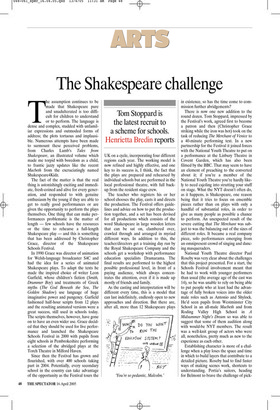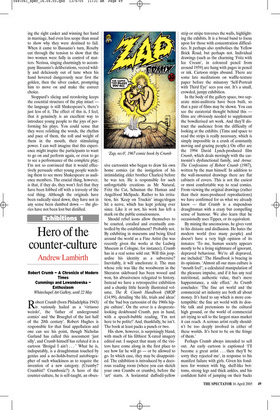The Shakespeare challenge
Tom Stoppard is the latest recruit to a scheme for schools. Henrietta Bredin reports
The assumption continues to be made that Shakespeare pure and unadulterated is too difficult for children to understand or to perform. The language is dense and complex, studded with unfamiliar expressions and outmoded forms of address; the plots tortuous and implausible. Numerous attempts have been made to surmount these perceived problems, from Charles Lamb’s Tales from Shakespeare, an illustrated volume which made me torpid with boredom as a child, to frantic jazzy updates like the recent Macbeth from the excruciatingly named Shakespeare4Kidz.
The fact of the matter is that the real thing is astonishingly exciting and immediate, fresh-coined and alive for every generation, and responded to with genuine enthusiasm by the young if they are able to get to really good performances or are given the opportunity to perform the plays themselves. One thing that can make performances problematic is the matter of length — few schools have the resources or the time to rehearse a full-length Shakespeare play — and this is something that has been addressed by Christopher Grace, director of the Shakespeare Schools Festival.
In 1990 Grace was director of animation for Welsh-language broadcaster S4C and had the idea for a series of animated Shakespeare plays. To adapt the texts he made the inspired choice of writer Leon Garfield, whose children’s fiction (Smith, Drummer Boy) and treatments of Greek myths (The God Beneath the Sea, The Golden Shadow) use language of huge imaginative power and pungency. Garfield fashioned half-hour scripts from 12 plays and the resulting animated versions were a great success, still used in schools today. The scripts themselves, however, have gone on to have an even wider use. Grace decided that they should be used for live performance and launched the Shakespeare Schools Festival in 2000 with pupils from eight schools in Pembrokeshire performing a selection of the abridged plays at the Torch Theatre in Milford Haven.
Since then the Festival has grown and flourished, with over 400 schools taking part in 2004. Potentially, every secondary school in the country can take advantage of the opportunity as the Festival tours the UK on a cycle, incorporating four different regions each year. The working model is now refined and highly effective, and one key to its success is, I think, the fact that the plays are prepared and rehearsed by individual schools but are performed in the local professional theatre, with full backup from the resident stage crew.
The teacher who registers his or her school chooses the play, casts it and directs the production. The Festival offers guidelines and advice on how to put the production together, and a set has been devised for all productions which consists of the word Shakespeare in large wooden letters that can be sat on, clambered over, crawled through and arranged in myriad different ways. In addition to this, the teacher/directors get a training day run by the Royal Shakespeare Company and the schools get a workshop with performance education specialists Dramarama. The final results are performed to the highest possible professional level, in front of a paying audience, which always concentrates the attention, even if it is made up mostly of friends and family.
As the casting and interpretation will be different every time, this is a model that can last indefinitely, endlessly open to new approaches and direction. But there are, after all, more than 12 Shakespeare plays in existence, so has the time come to commission further abridgements?
There is now one new addition to the round dozen. Tom Stoppard, impressed by the Festival’s work, agreed first to become a patron and then (Christopher Grace striking while the iron was hot) took on the task of reducing The Merchant of Venice to a 40-minute performing text. In a new partnership for the Festival it joined forces with the National Youth Theatre to put on a performance at the Linbury Theatre in Covent Garden, which has also been filmed by the BBC. That may seem to have an element of preaching to the converted about it; if you’re a member of the National Youth Theatre you’re hardly likely to need cajoling into strutting your stuff on stage. What the NYT doesn’t often do, as it happens, is Shakespeare, one reason being that it tries to focus on ensemble pieces rather than on plays with only a handful of substantial roles, in order to give as many people as possible a chance to perform. An unexpected result of the severe cutting that The Merchant was subject to was the balancing out of the sizes of different roles. It became a real company piece, solo performances emerging from an omnipresent crowd of singing and dancing masqueraders.
National Youth Theatre director Paul Roseby was very clear about the challenges that this project presented. For a start, the Schools Festival involvement meant that he had to work with younger performers than usual (the average age of the cast was 14), so he was unable to rely on being able to put people who at least had the advantage of fully broken voices into the older male roles such as Antonio and Shylock. He’d seen pupils from Westminster City School in an all-male Macbeth and from Roding Valley High School in A Midsummer Night’s Dream so was able to suggest that some of them audition along with would-be NYT members. The result was a well-knit group of actors who were all, nonetheless, pretty much as new to the experience as each other.
Establishing character is more of a challenge when a play loses the space and time in which to build layers that contribute to a detailed picture. Roseby had to find faster ways of making scenes work, shortcuts to understanding. Portia’s suitors, heading for Belmont to brave the challenge of pick ing the right casket and winning her hand in marriage, had even less scope than usual to show why they were destined to fail. When it came to Bassanio’s turn, Roseby cut through the tension to show that the two women were fully in control of matters. Nerissa, singing charmingly to accompany Bassanio’s deliberations, veered wildly and deliciously out of tune when his hand hovered dangerously near first the golden, then the silver casket, prompting him to move on and make the correct choice.
Stoppard’s slicing and reordering keeps the essential structure of the play intact the language is still Shakespeare’s, there’s just less of it. The effect of this is, I feel, that it genuinely is an excellent way to introduce young people to the joys of performing his plays. You could sense that they were relishing the words, the rhythm and pace of them, the roll and weight of them in the mouth, their stimulating power. I can well imagine that this experience might inspire the participants to want to go on and perform again, or even to go to see a performance of the complete play; I’m not so convinced that it would effectively persuade other young people watching them to see more Shakespeare as audience members. The crucial thing, however, is that, if they do, they won’t feel that they have been fobbed off with a travesty of the real thing. Although the originals have been radically sized down, they have not in any sense been dumbed down — the glories have not been lost but distilled.

























































 Previous page
Previous page